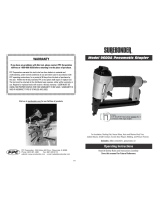Surebonder 9610A Installation guide
- Category
- Nail Gun
- Type
- Installation guide

FPC Corporation - 355 Hollow Hill Drive - Wauconda, IL 60084
Phone: (847) 487- 4583 Fax: (847) 487-0174
website: www.surebonder.com e-mail: [email protected]
112
Operating Instructions
Read Safety Rules and Instructions Carefully;
Save this manual for Future Reference
Model 9610 Pneumatic Stapler
®
1/4" thru 9/16”
SUREBONDER
®
Uses
or Duo-Fast® Wide Crown Staples
1/4" Crown Staples
No.6
Series
No.6
W
i
d
e
C
r
o
w
n
WARRANTY
If you have any problems with this tool, please call FPC
Corporation toll-free at 1-800-860-3838 before returning it to
the place of purchase.
FPC Corporation warrants this stapler to be free from defects in material
and workmanship, under normal conditions of use and when used in
accordance with FPC operating instructions, for a period of 90 days from
the date of purchase by the user. Within the 90 days warranty FPC at its
option shall repair or replace stapler. The stapler must be returned at the
distributor/user expense, either within warranty or out. Repaired or
replaced staplers will receive a 60 day warranty. USER MUST BE USING
THE PROPER STAPLES FOR THIS WARRANTY TO BE VALID. WARRANTY
IS VOID IF INCORRECT TYPE OF STAPLES ARE USED.
Visit us at surebonder.com for our full line of products

IMPORTANT SAFETY WARNINGS:
THE SAFETY WARNINGS BELOW CANNOT COVER ALL POSSIBLE SITUATIONS THAT MAY
OCCUR. THESE BASIC SAFETY PRECAUTIONS SHOULD ALWAYS BE FOLLOWED TO PROTECT
AGAINST PERSONAL INJURY TO THE OPERATOR OR OTHER PERSONNEL IN THE AREA, AS
WELL AS DAMAGE TO THE EQUIPMENT. READ AND UNDERSTAND THESE WARNINGS BEFORE
USING EQUIPMENT.
Keep tool away from children, and DO NOT allow children near work area. Do not allow children
or untrained personnel to handle this tool.
DO NOT operate this stapler while tired, or under the influence of drugs, alcohol, or medication
that makes you drowsy.
Never point the stapler at yourself or others - always assume that the stapler is loaded, and
proceed with caution.
Wear safety glasses and ear protection. The tool operator and all personnel in the work area
must wear safety glasses that protect the front and side, to avoid eye injury. Ear plugs should
be worn to avoid hearing damage.
If operator will be working in a situation where overhead work will be done (i.e. on a ladder,
stairs, or scaffolding) a hard hat must be worn.
Never wear loose clothing or jewelry because it can get caught in the moving parts of this tool.
Make sure long hair is covered, to avoid getting it caught in stapler.
Keep the tool pointed away from yourself and others at all times. Keep hands and all body parts
away from rear area of stapler (near air hose) to guard against injury. Keep hands and feet away
from firing head during use.
Keep proper balance and footing at all times - do not over-reach.
Never use oxygen, bottled gas or any type of combustible fuel as a power source - it can cause
an explosion and serious injury.
Do not use near flammable liquids or gases - the stapler sparks during operation, and could
cause an explosion and serious injury.
Use an air hose that will withstand at least 150 psi, OR 150% of the maximum pressure of the
compressor.
Never connect this tool to compressed air if the pressure could exceed 200 psi, as the stapler
could burst. Use only clean, dry, regulated compressed air, with pressure not exceeding 120 psi.
Disconnect stapler from air supply before loading staples, to prevent a staple being fired during
connection to air hose.
Do not use a non-relieving coupler with this stapler - if used, the stapler could remain charged
with air after disconnecting, and would still be able to drive a staple even after being
disconnected. The stapler and air hose must have a coupling so that all pressure is removed
from the stapler when the coupling is disconnected.
Do not depress the trigger or safety mechanism while loading staples - accidental firing of a
staple can occur. Keep your fingers away from the trigger when not firing staples. Always keep
the stapler pointed downward during loading.
Do not use an air hose that is too long - tool operator can trip over it. Make sure all connections
are tight.
Disconnect air hose from stapler
- before performing maintenance
- when clearing a jam
- when tool is not in use
- when moving it to another location
- when handing stapler to another person
(WARNINGS continued next page)
Seal Kit #9610 - 400 includes:
Seal Kit #9610 - 400includes:
Diagram # Description
Diagram # Description
5 Packing
6 Seal
8 0-Ring(18x2.4mm) (2)
10 0-Ring(31x2.4mm)
11 0-Ring(27.3x3mm) (2)
13 0-Ring(23x2.4mm)
14 0-Ring(40x1.9mm)
17 0-Ring(33x3.5mm)
19 Joint Guide
12 Drive Pin
2 Hex Head Bolt
l7 Spring
20 Seal
21 Switch
22 Spring
23 Step Pin
32 Hex Head Bolt
38 Click Lever Pin
40 Spring
42 Step Pin
45 Spring
Diagram # Description
Hardware Kit #9610 - 420 includes:
Drive Pin Kit #9610 - 410 includes:
Kits available:
www.surebonder.com
Replacement parts below are not available

Preparing for Use
If the stapler has been stored in a cold environment, bring it to a warm area and allow it to warm
up before using.
Loading
- Make sure stapler is disconnected from air supply.
- Only use the proper size and type of staple with this stapler, as specified under "Staples".
- Depress the track release lever to release the spring-loaded staple magazine; slide the magazine
out (back) as far as it will go.
- Turn the stapler upside down. Place a full strip of staples into the staple magazine, with the
staple points facing upward (away from the tool). Slide the staple magazine closed until the
track release lever snaps back into place with a click. (Closing the staple magazine while
staples are loaded engages the spring-load mechanism, so it will take slightly more pressure to
slide the magazine closed.)
Using the Stapler
- This stapler is equipped with a contact safety mechanism; the trigger will not operate unless the
contact mechanism is firmly depressed against the surface to be stapled.
- Grip the body of the stapler firmly, make sure that the contact mechanism is placed securely
against work surface, and pull the trigger to drive a staple.
- Remove finger from the trigger.
- To drive another staple, move the stapler to next area on work surface to be stapled, and repeat
these steps.
After Stapling
- Disconnect the air hose from the stapler.
- Remove all staples from the staple magazine of the stapler.
- Place several drops of oil (included in case) into the air plug.
- Shut off air compressor and drain any moisture from the compressor tank.
- Drain the air line filter; clean the filter element, then blow air in opposite direction to remove any
dirt/debris.
- Keep lubricator filled with oil (included in case).
Clearing Staple Jams
- Disconnect the air hose from the stapler.
- Carefully remove staple strip from staple magazine.
- Remove any remaining loose staples from inside the staple magazine, using pliers to grasp the
staples, if necessary.
- Once jammed staples have been removed, reload stapler.
20
0
40
60
80
100
120
140
160
Lubricator Regulator Filter
To compressor
To Air Tool
Quick Connector Quick Coupler
APPLICATIONS
Including, but not limited to: insulation, roofing felt, house wrap, auto and marine vinyl trim,
cabinet felt, cabinet backs, screen door repair, small furniture, light trim, molding and picture
frames, and general staple use.
FEATURES
- View window for staples
- Adjustable exhaust
- Rubber hand grip for comfort
- Firing Safety mechanism
- Easy drop-in staple loading
OPERATION
The Surebonder 9610 Pneumatic Stapler is designed to use No.6 heavy-duty wide crown
staples in 1/4”, 5/16”, 3/8", 1/2", and 9/16” leg lengths. For best results, use Surebonder Heavy
Duty Staples.
AIR SUPPLY
This stapler is designed to operate on clean, dry, regulated compressed air, between 60 and
100 psi. It is preferable to include an air filter, pressure regulator, and automatic oiler within 15
feet of the tool, if possible.
An air filter is needed to remove contaminates and moisture that are contained in compressed
air; filtering will significantly prolong the life of the tool. If an automatic oiler is not installed,
place 5 to 6 drops of oil into the tool's air inlet at the beginning of each work day.
The staple gun comes factory-equipped with a male quick connector. The staple gun must
always be connected to the air supply with a coupling that removes all pressure when it is
disconnected.
NOTE: all components used with this staple gun (air hose, connectors, regulators,
filters, etc) must be rated at 120 psi, OR 120% of the maximum compressor
potential, whichever is higher. Do not connect this staple gun to a system with
maximum potential air pressure greater than 200 psi.
AIR CONNECTION SETUP

Track Release
Lever
1/4” Male Quick
Release Connector
Adjustable
Exhaust
Trigger
Contact Safety
Mechanism
Staple magazine
Rubber Grip
DO NOT place finger on trigger when disconnecting air hose - the stapler could fire when
reconnected to the air supply.
Carry tool by the handle only, not by the air hose.
Do not drive staples close to the edge of the workpiece. It could split, allowing a staple to fly or
ricochet and causing personal injury. Do not try to drive staples at too steep an angle. Make
sure stapler is held firmly during firing to minimize recoil.
Do not drive a staple into very hard material, thin material, or on top of an existing staple - the
staple could ricochet, causing personal injury.
Never use the stapler if it is leaking air, the safety mechanism is not working, stapler has
missing or damaged parts, or requires repair. Make sure all screws and caps are securely
tightened.
Inspect the stapler before each use to insure that the trigger, safety mechanism, and spring are
operating properly. Lock the stapler in a clean, dry storage area between uses.
Only use parts, staples, and accessories supplied or recommended by FPC Corporation.
Unauthorized parts or fasteners can lead to malfunction and serious injury. Only personnel
trained by FPC Corporation, the distributor, or the employer shall repair the stapler. Do not
modify this tool without the written approval of FPC Corporation.
Manufacturer assumes no responsibility for consequential or indirect damages from the use of
this product.
Specifications
Overall Dimensions: 9.65" x 9.61" x 2.09"
Operating Pressure: 60 - 100 PSI (do not exceed 100 PSI)
Magazine Capacity: 100 Staples
Air Inlet Size: 3/8” NPT
Weight of Tool: 2.9 lbs.
Staple Type: No.6 Wide Crown Heavy Duty Staples 1/4’, 5/16", 3/8", 1/2"
and 9/16” leg lengths
Save this manual and have it available for tool operators reference!
Staple viewer
-
 1
1
-
 2
2
-
 3
3
-
 4
4
Surebonder 9610A Installation guide
- Category
- Nail Gun
- Type
- Installation guide
Ask a question and I''ll find the answer in the document
Finding information in a document is now easier with AI
Related papers
-
 Surebonder 9804 Installation guide
Surebonder 9804 Installation guide
-
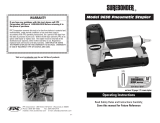 Surebonder 9630 User guide
Surebonder 9630 User guide
-
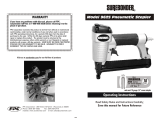 Surebonder 9630 Owner's manual
Surebonder 9630 Owner's manual
-
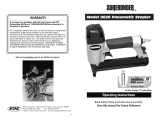 Surebonder 9630 Installation guide
Surebonder 9630 Installation guide
-
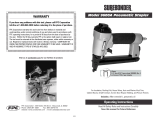 Surebonder 9600A-K User guide
Surebonder 9600A-K User guide
-
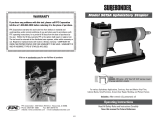 Surebonder 9615A-300-3 User guide
Surebonder 9615A-300-3 User guide
-
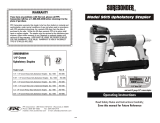 Surebonder 9615A-300-3 Installation guide
Surebonder 9615A-300-3 Installation guide
-
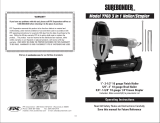 Surebonder 7760 Installation guide
Surebonder 7760 Installation guide
-
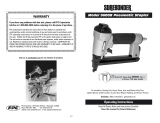 Surebonder 9600BK User manual
Surebonder 9600BK User manual
-
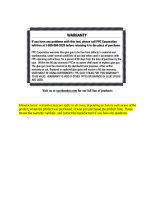 Surebonder PRO2-100 User manual
Surebonder PRO2-100 User manual














